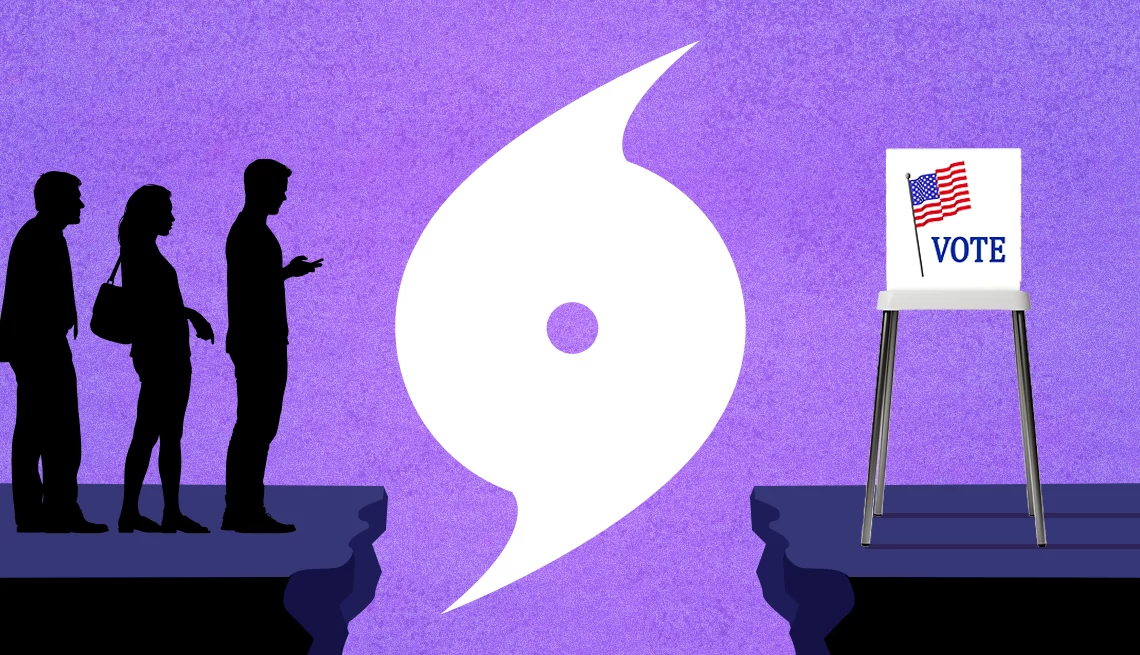AARP Hearing Center


Hurricane Helene ripped through the U.S. in late September, waterlogging absentee ballots and battering voting locations across the Southeast, including in key battleground states like North Carolina and Georgia. Less than two weeks later, Hurricane Milton roared across Florida, creating even more obstacles ahead of the Nov. 5 general election.
Election officials in Florida, Georgia, North Carolina, South Carolina and Tennessee have been working to assess damage, minimize disruptions and get information out to voters affected by power outages, flooding and destruction.
“We’re not going to stop how we do elections just because there’s been a hurricane,” said North Carolina State Board of Elections Director Kristen Bell during a press conference in early October. “We might have to do it a little differently, but we’re going to proceed.”
North Carolina and Florida, the hardest-hit states, issued official emergency orders that either lifted or relaxed certain state voting laws. Some of these accommodations are for voters. For example, in North Carolina, absentee voters in affected counties have additional options for dropping off their mail ballots. Some accommodations benefit election officials. In Florida, county election supervisors have extended deadlines to post voting sites and drop-box locations later than usual.
Georgia, South Carolina and Tennessee haven’t issued official changes to voting laws for the general election—except for South Carolina’s extended voter registration deadline, which has since passed. However, that doesn’t guarantee voters won’t experience changes, such as polling location shifts, potentially slower mail delivery, or longer lines due to limited poll workers. Election officials are working to advertise potential challenges and clarify voting options for affected voters. Still, they recommend voters be proactive in seeking information.
Learn How AARP Is Fighting for You
AARP is your fierce defender on the issues that matter to people 50-plus. Read more about how we fight for you every day in Congress and across the country.
“Voters need a plan for how they’re going to vote,” Georgia Secretary of State Press Secretary Mike Hassinger told AARP. “We always say that, but now, with these weather events, it’s more important than ever to plan.”
AARP fights for older Americans’ right to vote. As part of this effort, we’re tracking and alerting you to changes that may impact how you cast your ballot this election. Here is a rundown of important information for states recovering from Hurricanes Helene and Milton. Visit our state voting guides, linked below, for further details.
Florida
Gov. Ron DeSantis issued two executive orders—one after Hurricane Helene on Oct. 2, and another after Hurricane Milton on Oct. 16—granting a slate of emergency measures for 21 counties ahead of the general election. The counties are Charlotte, Citrus, Collier, Dixie, Glades, Hernando, Highlands, Hillsborough, Indian River, Lee, Levy, Madison, Manatee, Orange, Pasco, Pinellas, Polk, Sarasota, St. Lucie and Taylor.































































More From AARP
Candidates in Nine Pivotal Races Address the Issues
Get their takes on Social Security, Medicare, the economy and moreAARP Exclusive: Harris and Trump Reveal Where They Stand
Presidential candidates on Social Security, Medicare, prescription prices and moreMeet Election Poll Workers Showing Up Year After Year
Civic responsibility, social connections and even pay are prime motivatorsRecommended for You